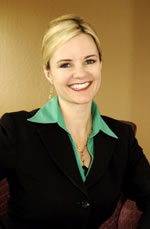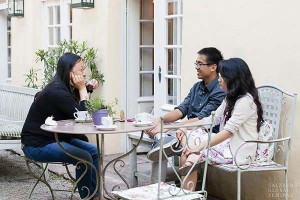
Karen Philbrick, executive director, Mineta Transportation Institute and the Mineta National Transit Research Consortium.
Karen Philbrick, the executive director of Mineta National Transit Research Consortium (MNTRC) and the Mineta Transportation Institute (MTI), has been awarded the Conference of Minority Transportation Officials (COMTO) Women Who Move the Nation Award in the academia category.
“I am so incredibly honored to be the recipient of this fine distinction,” said Philbrick, who has served as executive director of MNTRC and MTI since 2014. The programs are housed in the Lucas College and Graduate School of Business at San Jose State.
Philbrick was nominated by former Secretary of Transportation and former Congressman Norman Mineta, Nuria Fernandez, the CEO of VTA and Rod Diridon, MTI’s emeritus executive director. The trio nominated Philbrick for her role in developing MNTRC’s university partner relationships with four Minority Serving Institutions including SJSU, Howard University, Rutgers University and University of Nevada, Las Vegas.
“Your status and role in the transportation industry is an inspiration to all women, particularly women of color,” wrote Mioshi Moses, the president and CEO of COMTO, in the award notification letter. “Your professional achievements and pioneering spirit have opened career paths for women across the country.”
Philbrick said the university transportation center is focused on research, education, technology transfer and workforce development.
“In our particular field, we have a crisis of people available to enter the workforce,” she said, noting that a majority of people in the transportation sector are eligible for or nearing eligibility for retirement. “It includes everything from bus drivers to logistics managers to pilots. It includes everything from management all the way to the people on the ground maintaining the system.”
The center offers a master’s of science and transportation management as well as undergraduate courses. It also is involved in a variety of initiatives for K-12 students, including the Summer Transportation Institute that is designed for underrepresented minority and female high school students. Since 2012, the four partner universities have received $10.8 million to support initiatives.
MTI’s research informed the placement of new bike lanes in San Jose and formed the basis of the Caltrans Bus Rapid Transit handbook. The research has statewide, national and international impact. A recent focus of research has been on connectivity.
“We are looking at how to connect people and we are seeing a lot of different trends,” she said, noting that recent research is finding that millenials want to live, work and play where they can walk or take public transit.
Prior to being appointed as executive director of MNTRC and MTI, Philbrick served as MTI’s research director for five years, with two years as deputy executive director and research director for both MTI and MNTRC. She led three MTI research subcenters, directed more than 200 principal investigators for both agencies, oversaw the completion of 122 research projects and the production of more than 175 peer-reviewed research reports and journal publications.
She serves on the U.S. Department of Transportation Transit Advisory Committee for Safety and as treasurer of the Executive Committee of the Council of University Transportation Centers.
